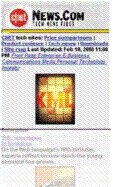Opera displays the full web on small screens
Oct 15, 2002 — by LinuxDevices Staff — from the LinuxDevices Archive — 2 views[Press release excerpt] — Opera Software today presented a technology breakthrough that will bring the power of the full Internet into the pockets of millions of users. Opera Software has finally cracked the screen size problem that has plagued and stopped the full-scale implementation of the full Internet onto small mobile devices. Opera's engineers have managed to reformat existing HTML Web sites to fit on small screens, while maintaining Opera's small size and low resource consumption, making the full Internet now an option on mobile phones. Opera's breakthrough has been met with enthusiasm from the wireless industry, and work is progressing on several business deals.
In the past, the favorite solution to the problem of scaling Web pages to fit a small screen was to zoom or scroll horizontally, something that has not provided users with a good Internet experience. Alternatively, the industry has experimented with new formats like the wireless application protocol (WAP) and the Japanese iMode. The former has largely proved a failure because of the lack of content since most Web sites did not want to support several different formats. While iMode has managed to avoid some of WAP's problem of lack of content, users have still suffered from the lack of access to the full Internet and their favorite sites. With Opera's Small-Screen Rendering, WAP and iMode will over time be made redundant.


Example of Opera browser's Small Screen Rendering. The left image indicates how a normal web page tends to display on a phone's tiny LCD; the right image shows how SSR renders the page.
(click each image for a larger view)
Content providers will save cost by not having to provide several versions of their sites in different formats like those demanded by today's WAP-technology, operators will get a more attractive product, and all users will finally be able to access their favorite Web sites from their small mobile devices.
Already offering a fast, small, modular, and standards-compliant browser that ensures access to all Web sites, Opera is an established leader in the market for small-screen devices like smartphones, the computer-enabled mobile phones now hitting the market, and Personal Digital Assistants (PDAs). In the smartphone segment, Opera is Symbian, Ltd.'s default browser, the world's leading mobile phone manufacturers consortium. On PDAs, Opera is the critically acclaimed default browser on Sharp's line of Zaurus PDAs.
With Opera offering full access to the whole Web via HTML on smartphones, entirely new revenue possibilities are opening up for all players in the wireless industry. With full Internet access to smartphones, telecom operators can create new revenue streams while saving costs. Apart from the fact that users will use the telecom network more to access their favorite Web sites, operators might be able to for example charge a monthly fee for full HTML access from a mobile phone. Opera's browser performs all the rendering on the client itself, eliminating the need for expensive and complicated server solutions residing with the telecom operators.
To see how Opera's new reformatting process works, please visit this page on Opera's website.
This article was originally published on LinuxDevices.com and has been donated to the open source community by QuinStreet Inc. Please visit LinuxToday.com for up-to-date news and articles about Linux and open source.